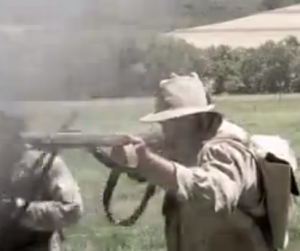Tony and Ridley Scott's Gettysburg: The History Channel Gets Gritty
 I have recently sat down and rewatched the latest film on the Battle of Gettysburg. Aired by the History Channel way back in May, 2011. This film combines traditional narration with some recreations meant to stir the soul. Filmmakers Tony and Ridley Scott promised realistic Civil War combat - and they delivered. This multi-part film following several individuals through three days of battle offers all the blood spewing, bone splintering, skull splitting action that anyone could handle. What's more, viewers can (with the help of computer animation) follow bullets as they speed through the air to do their grim work, witness cannon shot and shell ripping bodies to pieces, and even whisk along electronically with the marvel of telegraph messages. Wow! How about that!!!
Adding credibility to the mix, a coterie of first-rate historians add their two cents to the narration. Edward Ayers and James McPherson are among the group of scholars weighing in on the many aspects of the battle.
I have recently sat down and rewatched the latest film on the Battle of Gettysburg. Aired by the History Channel way back in May, 2011. This film combines traditional narration with some recreations meant to stir the soul. Filmmakers Tony and Ridley Scott promised realistic Civil War combat - and they delivered. This multi-part film following several individuals through three days of battle offers all the blood spewing, bone splintering, skull splitting action that anyone could handle. What's more, viewers can (with the help of computer animation) follow bullets as they speed through the air to do their grim work, witness cannon shot and shell ripping bodies to pieces, and even whisk along electronically with the marvel of telegraph messages. Wow! How about that!!!
Adding credibility to the mix, a coterie of first-rate historians add their two cents to the narration. Edward Ayers and James McPherson are among the group of scholars weighing in on the many aspects of the battle.
I have checked out the reviews on Gettysburg, and I have turned up just about what one might expect: a host of bloggers picking nits. The biggest complaints: Hardee hats pinned on the wrong side, poured concrete walls in the 19th century, rectangular shaped ANV battle flags - the list goes on, and I will not bore you with the rest.
To be honest, none of those things troubles me in the least - I mean....it's a movie people. Get over it. But as this film has grander didactic purposes (as professed by the History Channel), there is one kinda big thing that does bother me.
The notion of "turning point" hangs over this film like an ominous cloud - and this is a point that should indeed be reckoned with. Variously interspersed throughout the film, one gathers that the war - the whole whoopdeedoo - is in the hands of those who make the crucial decisions here on these Pennsylvania fields. And this - both explicitly and implicitly - is ultimately the analytical thrust of Gettysburg.
So while the film is spectacularly successful in the blood and guts department, I give it a C- for analysis. Suggesting that the war hinged on this one battle is nothing more than a case of reading history knowing full well what happened next. In July 1863, while Rebels were devastated by defeat as much as Yankees were elated by victory, the war had yet to be won or lost.
Gettysburg fits neatly into what one could call an "Appomattox Syndrome." It is an easy trap to spring - knowing, as we do, that the Army of Northern Virginia never again boasted pre-Gettysburg victories like those at Fredericksburg or Chancellorsville. A steady trajectory toward certain Confederate defeat, then, is what modern viewers expect after July's cinematic fortunes smile on the Union.
It is not, however, what the Confederates expected. There were many more bright spots for the Rebels after the Battle of Gettysburg - and most expected independence would come sooner or later - why else would they fight on for two more years? After all, the (very vocal) war-weary in the North were growing more and more tired of the incessant grind of war...and the casualty lists mounted by the day.
So let's not think that Gettysburg settled things once and for all - those who fought there certainly didn't.
With compliments,
Keith
PS - I do not own a TV...and find about 99% of what airs to be completely useless. Thus, I turn to Youtube or streaming Netflix if I absolutely must see something. In the case of Gettysburg, I found it in several parts HERE. Also - I love what they did with Dan Sickles. Yes...I think he was devious too. He is one of my favorite Civil War characters.